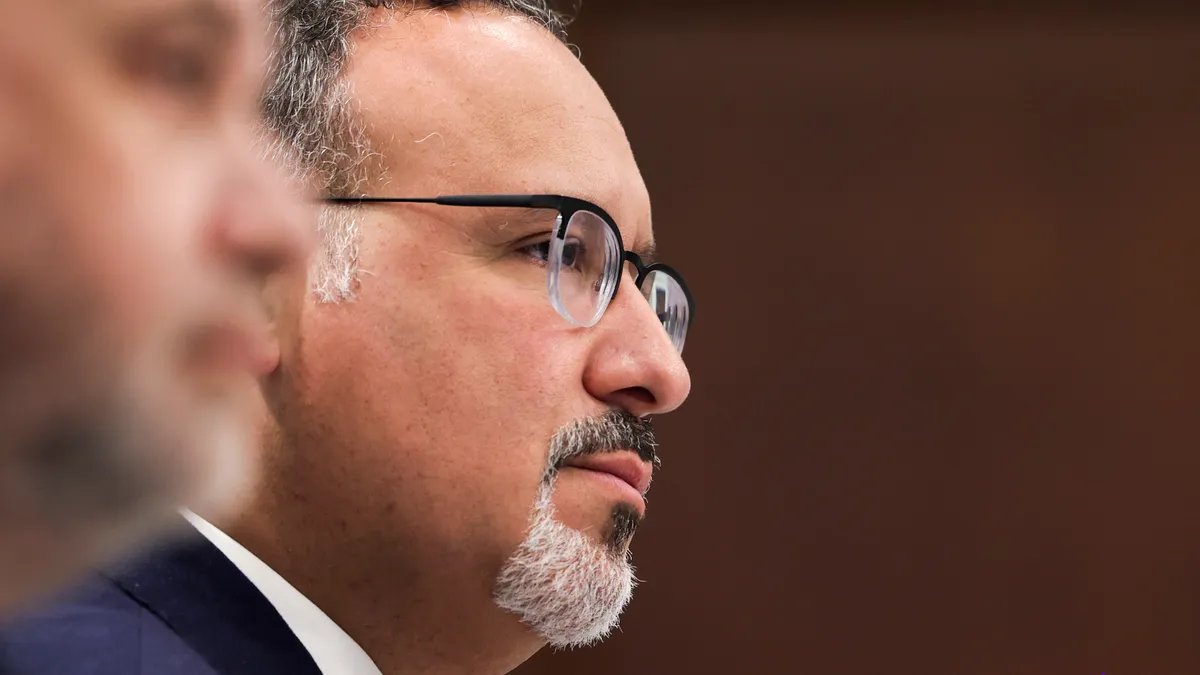A federal judge said he will decide within a matter of days whether to allow the U.S. Department of Education to settle a class-action lawsuit, which would wipe away about $6 billion worth of student loans for around 200,000 borrowers who said their colleges misled them.
U.S. District Judge William Alsup heard arguments Wednesday from the Biden administration, as well as colleges opposing the proposed settlement.
“I need to study this a bit,” Alsup said during the hearing. “About a few days to a week, I will get an order out that will be in writing that will explain who wins and who loses.”
The agreement would end a lawsuit filed in 2019 that accused the Education Department of mishandling borrower defense to repayment claims, which allow borrowers defrauded by their colleges to have their federal student loan debts cleared. Plaintiffs said the department improperly delayed decisions on their claims and that the Trump administration unlawfully issued blanket denials.
The agreement would automatically clear federal student loan debts for those who filed a borrower defense claim against a college on a list of 150-plus schools.
The department said it has the authority to provide the relief because federal law gives the education secretary broad power to “compromise, waive, or release any right, title, claim, lien, or demand” related to federal student loans.
In court documents filed Wednesday, the department said it has used this same authority to discharge more than $11.4 billion worth of student loans this year for borrowers who attended several shuttered for-profit colleges, including Corinthian Colleges, ITT Technical Institute and Westwood College.
The Trump administration also used this authority to wipe away debts owed by borrowers who attended certain institutions run by Dream Center Education Holdings, a college operator that was behind the sudden closure and loss of accreditation at several schools.
Four colleges on the Education Department’s list have objected to the judge approving the settlement. They rejected the department’s argument that federal law gives it the ability to wipe away the debts.
They include two nonprofit institutions, the Chicago School of Professional Psychology and Everglades College, and two for-profits, American National University and Lincoln Education Services Corp. They have also argued the settlement denies them due process rights and that their inclusion on the list has damaged their reputations.
Terance Gonsalves, a lawyer representing the Chicago School of Professional Psychology, argued Wednesday that the federal law in question “cannot be looked at in a vacuum.”
Gonsalves said the Education Department must still follow borrower defense regulations. Although there have been different versions of these rules over the last few years, the Chicago School has argued the settlement agreement would sidestep these altogether and deny the institution its due process rights.
That’s because the rules allow colleges to respond to borrower defense applications and submit their own evidence, the institution said.
“The borrower defense regulations are in place to ensure that where a claim meets the legal standard, a borrower receives the relief to which they are entitled,” the Chicago School wrote in court documents. “It is not in the public’s interest to unfairly label over 150 schools as wrongdoers without evidence."
Gonsalves also raised concerns that some students would benefit from the debt relief even though they had received settlements elsewhere. For instance, Gonsalves said the Chicago School had settled a class-action lawsuit with students by giving them each $90,000.
“If they did not use that money to repay their loans and they have filed a borrower defense application — like we know four did — they are going to get an extra benefit because they got the $90,000,” Gonsalves said.
R. Charlie Merritt, a Justice Department lawyer, contended that the example wasn’t relevant to whether the settlement agreement should be approved.
“All the department can do is discharge outstanding loan debt the department holds or provide refunds for amounts previously collected,” Merritt said. “We have no way of knowing what recoveries have been made in other contexts.”
Who will be impacted?
If the judge approves the settlement, roughly 200,000 borrowers will automatically receive relief because they attended one of the institutions on the Education Department’s list. The colleges on the list include those that have closed and some that are still open, such as Capella and DeVry universities. For-profit colleges dominate the list.
The department said it found “a sufficient threshold indication of wrongdoing” at these colleges to justify their attendees receiving loan relief, according to court documents.
The settlement will also set up a streamlined review process for those who filed borrower defense applications but didn’t attend one of the colleges. Granting automatic relief to around 200,000 borrowers frees up Education Department resources to render decisions on some 64,000 other borrower defense claims, the agency told the court.
The court received more than 1,500 comments from borrowers about the settlement. Over 1,000 supported the agreement.
Around 170 raised objections, many of which argued the department should extend the relief to more people. That included borrowers who wanted their colleges to be added to the list of colleges and those who wanted federal loans that had been consolidated into private ones to be eligible for forgiveness.






















